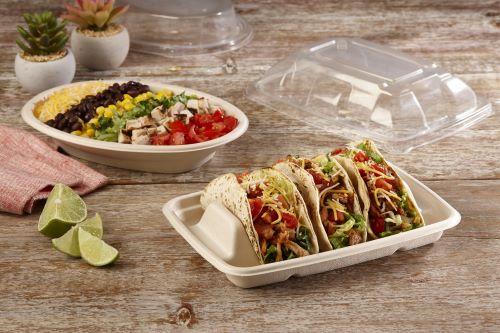Takeaways from the COMPOST2024 Conference

Image: Pulp Plus™ All-in-One Taco Tray
The US Composting Council’s Compost2024 conference is an exciting event that brings together industry professionals and experts in the foodservice industry to discuss and drive change in sustainable practices. According to Robert Beagan, Sabert’s Director of Sustainable Growth Platforms, here are the top seven takeaways from COMPOST2024.
Compostable product acceptance will grow without legislation.
Despite popular belief, many composters accept compostable products, proving that contamination can be minimized when managed correctly and with the right relationships and accountability in place. It was noted that sharing success stories and best management practices can spur organic growth for more acceptance.
The right legislation will accelerate growth.
Another significant topic was the role of legislation in accelerating sustainable practices. Laws need to account for a variety of factors to be the most effective. Extended Producer Responsibility (EPR) should support infrastructure development and education programs. Compliance with non-compostables and greenwashing should not be overlooked.
National or state-level legislation is needed.
Local laws are a great start but can be a double-edged sword. For instance, an ordinance in one town may not be a mandate in the neighboring city. This confusing landscape creates inconsistency in consumer behavior, leading to increased contamination and frustration for haulers and composters.
The industry will get the infrastructure right.
Compostable product acceptance was the hottest topic of the week. The amount of dialogue and collaboration from the entire value chain was a key indicator of interest in getting the proper infrastructure to manage all stakeholders' wins successfully.
Non-subscription collection should ramp up.
Going all in on curbside collection on day one is too ambitious. Allow time for programs to scale up, educate on best practices, and address contamination challenges. The crawl, walk, and run approach is generally key to changing behaviors.
Field testing needs standardization.
A lot of new research on field testing was presented this week, and the results show a lot of promise for compostable product disintegration. Testing needs to be standardized to help reinforce real-world scenarios, offer legislators critical insights, and avoid the skewing of results.
Certified compostable product capacity needs to grow to support systems change.
Especially in a world where consumption is not slowing down, brands are committing to plastic reduction and responsible end-of-life packaging as a top priority. The more certified products available will help widen the scope of available products to execute responsible end-of-life.
Today's foodservice industry is marked by its complexity, with consumer expectations, regulatory requirements, and sustainability goals all shaping business operations. To navigate this landscape, operators must be agile and informed. The discussions at COMPOST2024 highlighted a promising future of composting for the industry with a clear trajectory toward more sustainable practices.
To get started, check out this list of sustainable packaging solutions.







